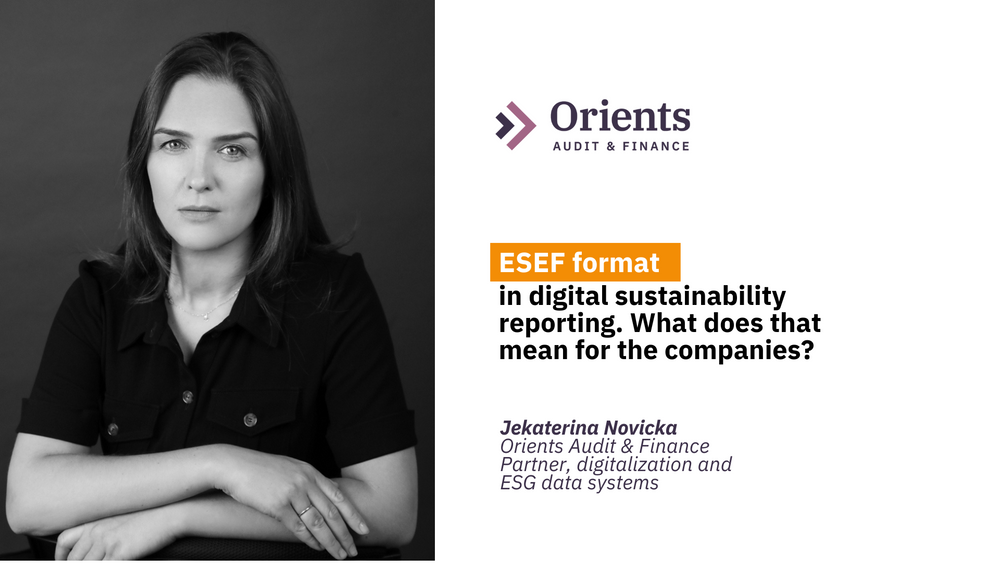ESEF format for digital sustainability reporting. What does that mean for the companies?

There is a lot of sustainability content and it's easy to get lost in it. Although the EU has created a regulatory framework - the Corporate Sustainability Reporting Directive (CSRD). It defines that ESG data should be reported in the digital iXBRL format.
The CSRD stipulates that initially sustainability information will have to be provided by large companies in the EU and will be part of their management report in the annual report. Information will be provided in accordance with the European Sustainability Reporting Standards (ESRS) that have been just recently approved by European Commission. Additionally, the CSRD determines that sustainability information will have to be reported digitally in accordance with the European Single Electronic Format (ESEF). Let's try to understand what this means for companies facing the requirement.
The ESEF means providing information in a machine-readable and human-readable format - Inline XBRL (iXBRL). This open data format was invented twenty-five years ago in US. However, only nowadays it is actively entering our lives along with the rapid development of other Industry 4.0 and 5.0 technologies. Since 2021, listed entities have been providing their consolidated annual reports in ESEF format in accordance with the IFRS taxonomy.
The XBRL format is intended for efficient work with big data processing by systems with artificial intelligence or machine-learning engines. In a sense, the introduction of iXBRL by the regulator is a revolution not only in digital reporting but also a major challenge for internal data processing systems. However, it is also an enormous opportunity for those who will timely understand that sustainability processes and ESG data management have to be approached digitally.
To convert the human-readable format that we are used to - Word, Excel, PDF, to the iXBRL format, a specialized tool with built-in digital taxonomy of relevant standards, such as IFRS or ESRS, is required. We are currently awaiting the launch of the ESRS digital taxonomy, a dictionary that defines and links data elements and relationships for sustainability reporting purposes. The said conversion process is called iXBRL data tagging, which is done manually. Therefore, in addition to the tool, tagging requires professional skills and is a rather time-consuming process. Hence, when reporting on sustainability digitally, it is important to find professional partners who will be able to support or carry out the tagging process for the company as efficiently and effectively as possible.
Currently, the sustainability reporting task in companies is mostly delegated to an employee responsible for sustainability. When a company becomes a subject of CSRD and digital reporting must be implemented, major changes in the areas of responsibility happen. Firstly, the preparation of the annual report, which will include sustainability information as part of the management report, is the responsibility of the chief accountant. Secondly, under a new directive, limited assurance by certified auditors is required for sustainability information in the annual report.
Therefore, the person responsible for the timely submission of the annual report, in addition to the usual process of preparing the annual report, must schedule the time and provide expertise and resources (financial and human) for working with the auditors on two more new tasks - audit of the sustainability report and audit of the ESEF format.
In a couple of years, the European Single Access Point (ESAP) will be created, where all financial and sustainability data of EU companies will be collected and available to everyone in a machine-readable format. That being the case, the digital iXBRL reporting format opens a golden door where digital transformation primarily means efficient work with big data.
So, remember that an effective environmental, social, and governance (ESG) reporting strategy ultimately starts with quality data sources. Besides ESRS digital taxonomy provides a guideline to follow when restructuring your internal data flows. In this process, data analysts, accountants, CFOs, and others who are responsible for the company's data and can provide a framework for the sustainability specialist to choose a strategy, should be primarily involved.
When choosing a tool that converts the human-readable format of reports to the ESEF format, you should look for external partners with several years of experience in working with XBRL. With a quality tool and reliable partners, the report conversion to ESEF format will go smoothly and quickly. In addition to the management team, it is important to educate your team about the iXBRL data format and the potential risks and opportunities it brings to the company. As well as while choosing a certified auditor, attention should be paid to both expertise in the topic of sustainability and experience in the review of ESEF reports, understanding iXBRL open data format. Proudly, at Orients Audit & Finance, we are prepared to be a good match for described experience and expertise criteria both as consultants and as auditors. Contact our partner Jekaterina Novicka to discuss further cooperation opportunities in Latvia and other EU countries: jekaterina@orients.lv.
To summarize it should be emphasized that the iXBRL format is here to stay in the world of reports and analytical tools. It is also clear that the scale of its application will only expand over time. It is important to start educating yourself with XBRL early and to study the possibilities that XBRL-based systems offer in terms of new sustainability data processes. Remember that today reliable, and smartly structured big data is becoming new corporate gold that ensures sustained competitive advantage.
Want to know more about the iXBRL format of sustainability reporting information, or to take a look at ESRS digital taxonomy, email our digitalization and ESG data system partner, Jekaterina Novicka, at jekaterina@orients.lv. Or, read more about the ESEF compliant digitalization services of the reporting at our website: https://www.orients.lv/en/expertise/esef-reporting/.